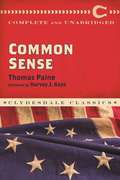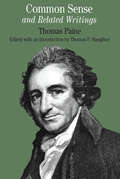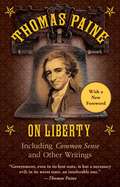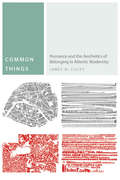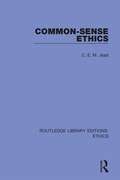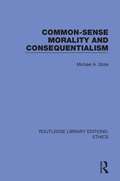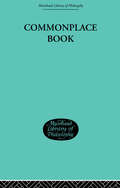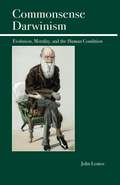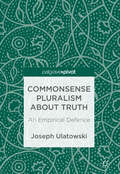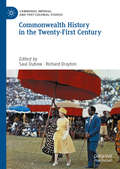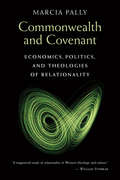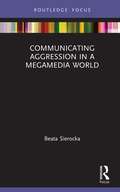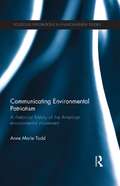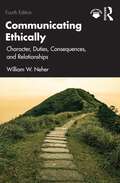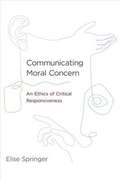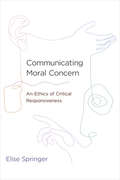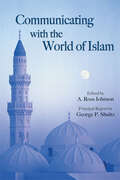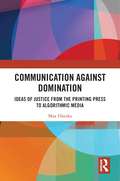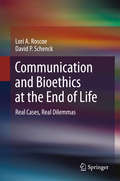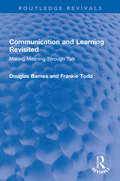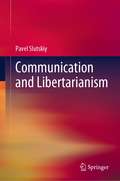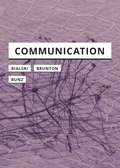- Table View
- List View
Common Sense: Addressed To The Inhabitants Of America
by Thomas Paine Harvey KayePackaged in handsome, affordable trade editions, Clydesdale Classics is a new series of essential works. From the musings of famed scholars such as Plato in Republic to the striking personal narrative of Harriet Jacobs in Incidents in the Life of a Slave Girl, this new series is a comprehensive collection of our intellectual history through the words of the exceptional few.Common Sense is a compelling work written by famed philosopher and political thinker Thomas Paine to champion the United States’ independence from Great Britain. It is often dubbed the bestselling American title of all time, proportionately, although no sales numbers were recorded to support this claim. The pamphlet addresses the issues with monarchy and tyranny in England, as well as the problems with the English Constitution. Additionally, Paine comments on the capabilities of America as an independent nation, as well as its contemporary state of affairs.With its sensible and beautiful prose, as well as the inclusion of a brand-new foreword by historian Harvey J. Kaye, this edition of Paine’s Common Sense is sure to spark passion and pride in American readers just as it did 240 years ago.
Common Sense: Addressed To The Inhabitants Of America
by Thomas PaineThomas Paine’s Common Sense is one of the most important and often assigned primary documents of the Revolutionary era. This edition of the pamphlet is unique in its inclusion of selections from Paine’s other writings from 1775 and 1776 — additional essays that contextualize Common Sense and provide unusual insight on both the writer and the cause for which he wrote. The volume introduction includes coverage of Paine’s childhood and early adult years in England, arguing for the significance of personal experience, environment, career, and religion in understanding Paine’s influential political writings. The volume also includes a glossary, a chronology, 12 illustrations, a selected bibliography, and questions for consideration.
Common Sense: and Other Writings
by Thomas Paine Alan DershowitzThomas Paine is most famous for writing Common Sense, a pamphlet distributed during the American Revolution advocating for colonial America's independence from Great Britain. Now, collected here in a beautiful gift book volume, are excerpts from this important historical American document, as well as several of his other writings. This volume is introduced by Alan Dershowitz, Professor of Law, Emeritus at Harvard Law School and a noted civil liberties advocate. Paine believed in more than just freedom in the form of revolution and overthrowing governments. He also believed in freedom from oppressive and organized religions and monopolies. Included in this book are passages taken from The Age of Reason and The Rights of Man, as well as letters to George Washington, Benjamin Rush, and Samuel Adams, and pamphlets such as "The American Crisis" and "Agrarian Justice." Throughout his writings, Paine provides excellent and timeless wisdom on attaining liberty and living a democratic life.
Common Things: Romance and the Aesthetics of Belonging in Atlantic Modernity (Commonalities)
by James D. LilleyWhat are the relationships between the books we read and the communities we share? Common Things explores how transatlantic romance revivals of the eighteenth and nineteenth century influenced—and were influenced by—emerging modern systems of community.Drawing on the work of Washington Irving, Henry Mackenzie, Thomas Jefferson, James Fenimore Cooper, Robert Montgomery Bird, and Charles Brockden Brown, the book shows how romance promotes a distinctive aesthetics of belonging—a mode of being in common tied to new qualities of the singular. Each chapter focuses on one of these common things—the stain of race, the “property” of personhood, ruined feelings, the genre of a text, and the event of history—and examines how these peculiar qualities work to sustain the coherence of our modern common places. In the work of Horace Walpole and Edgar Allan Poe, the book further uncovers an important— and never more timely—alternative aesthetic practice that reimagines community as an open and fugitive process rather than as a collection of common things.
Common Values
by Sissela BokIn this book, Sissela Bok asks what moral values, if any, might be capable of being shared across national, ethnic, religious, and other boundaries, under what circumstances, and with what qualifications. As the twentieth century draws to a close, societies confront challenges and threats - whether from environmental or military or from epidemics such as cholera or AIDS - that cross every boundary. Responses, to be effective, must be collective as well; yet they cannot begin to be effective, Bok suggests, without greater stress on common values and goals.
Common-Sense Ethics
by C. E. JoadOriginally published in 1921, this book makes philosophical ethics accessible to the non-philosopher and applies them to problems of everyday life. The author maintains that morality is the rationalization of the impulse to blame and emphases the importance of impulses. He illustrates how modern society conspires to suppress impulses and restrict their operation.
Common-Sense Morality and Consequentialism
by Michael A. SloteOriginally published in 1985 and now re-issued with a new preface, this study assesses the two major moral theories of ethical consequentialism and common-sense morality by means of mutual comparison and an attempt to elicit the implications and tendencies of each theory individually. The author shows that criticisms and defences of common-sense morality and of consequentialism give inadequate characterizations of the dispute between them and thus at best provide incomplete rationales for either of these influential moral views. Both theories face inherent difficulties, some familiar but others mentioned for the first time in this work. The argument proceeds by reference to historical figures like Bentham, Ross and Sidgwick and to contemporary thinkers such as Williams, Nagel, Hare and Sen.
Commonplace Book: 1919-1953 (Key Texts Ser.)
by Moore, George EdwardFirst published in 2002. Routledge is an imprint of Taylor & Francis, an informa company.
Commonsense Darwinism: Evolution, Morality, And The Human Condition
by John LemosWritten in a simple, accessible style, Commonsense Darwinism offers a clear, critical examination of the subject. Assuming that the diversity of life, including human beings, is the result of evolution from common origins and that its driving force is natural selection, the book explores what this might mean for issues in ethics, philosophy of religion, epistemology, and metaphysics. The author’s defense of free will makes this an especially stimulating read.
Commonsense Pluralism about Truth: An Empirical Defence
by Joseph UlatowskiTruth is a pervasive feature of ordinary language, deserving of systematic study, and few theorists of truth have endeavoured to chronicle the tousled conceptual terrain forming the non-philosopher's ordinary view. In this book, the author recasts the philosophical treatment of truth in light of historical and recent work in experimental philosophy. He argues that the commonsense view of truth is deeply fragmented along two axes, across different linguistic discourses and among different demographics, termed in the book as endoxic alethic pluralism. To defend this view, four conclusions must be reached: (1) endoxic alethic pluralism should be compatible with how the everyday person uses truth, (2) the common conception of truth should be derivable from empirical data, (3) this descriptive metaphysical project is one aspect of a normative theory of truth, and (4) endoxic alethic pluralism is at least partially immune to challenges facing the ecological method in experimental philosophy and alethic pluralism.
Commonwealth History in the Twenty-First Century (Cambridge Imperial and Post-Colonial Studies Series)
by Saul Dubow Richard DraytonThis edited collection draws together new historical writing on the Commonwealth. It features the work of younger scholars, as well as established academics, and highlights themes such as law and sovereignty, republicanism and the monarchy, French engagement with the Commonwealth, the anti-apartheid struggle, race and immigration, memory and commemoration, and banking. The volume focusses less on the Commonwealth as an institution than on the relevance and meaning of the Commonwealth to its member countries and peoples. By adopting oblique, de-centred, approaches to Commonwealth history, unusual or overlooked connections are brought to the fore while old problems are looked at from fresh vantage points – be this turning points like the relationship between ‘old’ and `new’ Commonwealth members from 1949, or the distinctive roles of major figures like Jawaharlal Nehru or Jan Smuts. The volume thereby aims to refresh interest in Commonwealth history as a field of comparative international history.
Commonwealth and Covenant: Economics, Politics, and Theologies of Relationality
by Marcia PallyIn Commonwealth and Covenant Marcia Pally argues that in order to address current socioeconomic problems, we need not more economic formulas but rather a better understanding of how the world is set up — an ontology of how we and the world work. Without this, good proposals that arise lack political will and go unimplemented. Pally describes our basic setup as “separability-amid-situatedness” or “distinction-amid-relation.” Though we are all unique individuals, we become our singular selves through our relations and responsibilities to the people and environments around us. Pally argues that our culture’s overemphasis on “separability” — individualism run amok — results in greed, adversarial and deceitful political discourse and chicanery, resource grabbing, broken relationships, and anomie. Maintaining that separability and situatedness can and must be considered together in public policy, Pally draws on intellectual history, philosophy, and — especially — historic Christian and Jewish theologies of relationality to construct a new framework for addressing present economic and political ills.
Commonwealth and Covenant: Economics, Politics, and Theologies of Relationality
by Marcia PallyIn Commonwealth and Covenant Marcia Pally argues that in order to address current socioeconomic problems, we need not more economic formulas but rather a better understanding of how the world is set up — an ontology of how we and the world work. Without this, good proposals that arise lack political will and go unimplemented. Pally describes our basic setup as &“separability-amid-situatedness&” or &“distinction-amid-relation.&” Though we are all unique individuals, we become our singular selves through our relations and responsibilities to the people and environments around us. Pally argues that our culture&’s overemphasis on &“separability&” — individualism run amok — results in greed, adversarial and deceitful political discourse and chicanery, resource grabbing, broken relationships, and anomie. Maintaining that separability and situatedness can and must be considered together in public policy, Pally draws on intellectual history, philosophy, and — especially — historic Christian and Jewish theologies of relationality to construct a new framework for addressing present economic and political ills.
Communicating Aggression in a Megamedia World (Routledge Focus on Communication Studies)
by Beata SierockaThis book describes how, in the era of megamedia culture, aggression in communication constitutes a threat to the communication community. Based on the theoretical incorporation of transcendental pragmatics, the book explores how conceptualizing the phenomena of megamedia aggression from this perspective and diagnosing their destructive force are essential for: postulating the need for constructing a theory of media communication closely related to the model of discursive rationality, giving this theory a critical and normative character, and embedding it in the perspective of the project of social co-responsibility and in the plan for an ethics of co-responsibility. Combining key elements of media theory, the philosophy of communication, the concept of normative ethics and the fields of social psychology and social anthropology, this book will be of great interest to scholars and students in the areas of communication studies, philosophy, anthropology, psychology and psychoanalysis.
Communicating Environmental Patriotism: A Rhetorical History of the American Environmental Movement (Routledge Explorations in Environmental Studies)
by Anne Marie ToddEnvironmental patriotism, the belief that the national environment defines a country’s greatness, is a significant strand in twentieth century American environmentalism. This book is the first to explore the history of environmental patriotism in America through the intriguing stories of environmental patriots and the rhetoric of their speeches and propaganda, The See America First movement began in 1906 with the aim of protecting and promoting the landscapes of the American West. In 1908, Gifford Pinchot and President Theodore Roosevelt hosted the White House Conservation Conference to promote the wise use of natural resources for generations of Americans. In 1912, Pittsburgh’s smoke investigation condemned the effects of coal smoke on the city’s environment. In World War II, a massive propaganda effort mobilized millions of Americans to plant victory gardens to save resources for the war abroad. While these may not seem like crucial moments for the American environmental movement, this new history of American environmentalism shows that they are linked by patriotism. The book offers a provoking critique of environmentalists’ communication strategies and suggests patriotism as a persuasive hook for new ways to make environmental issues a national priority. This original research should be of interest to scholars of environmental communication, environmental history, American history and environmental philosophy.
Communicating Ethically: Character, Duties, Consequences, and Relationships
by William W. NeherThis thoroughly updated fourth edition provides a broad introduction to the major theoretical perspectives on the ethics of communication. It brings together classical and modern theories of ethical philosophy to address issues at play in specific careers and domains throughout the field. By incorporating a simple framework for ethical reasoning, readers are able to develop their own understanding of various criteria for making ethical judgments. The book applies ethical theories, such as virtue and dialogical ethics, to interpersonal, organizational, political, social media, and digital communication contexts. This edition contains expanded coverage of contemporary and non-Western issues and theories. This includes the Black Lives Matter and #MeToo movements, "fake news", new technologies such as "Deepfake" videos, Confucian ethics, and Igbo ethics. It also includes a new chapter on the ethics of communicating scientific and medical risks. This book serves as a core textbook for undergraduate courses in Communication and Media Ethics and can also be used as a supplemental resource for field-specific courses in Strategic Communication, Interpersonal Communication, and Public Relations. Online resources for instructors include sample syllabi, sample assignments, and a test bank for multiple choice and essay questions. They are available at www.routledge.com/9781032507798.
Communicating Moral Concern
by Elise SpringerModern moral theories have crystallized around the logic of individual choices,abstracted from social and historical context. Yet most action, including moral theorizing, canequally be understood as a response, conscious or otherwise, to the social world out of which itemerges. In this novel account of moral agency, Elise Springer accords central importance to how weintervene in activity around us. To notice and address what others are doing with their moral agencyis to exercise what Springer calls critical responsiveness. Her account of this responsivenesssteers critics away from both of the conventionally familiar ideals -- justifying and expressingreactive attitudes on one hand, and prescribing and manipulating behavioral outcomes on the other. Good critical practice functions instead as a dynamic gestural engagement of attention, reachingfurther than expressive representation but not as far as causal control. To make sense of suchengagement, Springer unravels the influence of several entrenched philosophical dichotomies (activevs. passive, representation vs. object, illocution vs. perlocution). Where previous accounts havebeen preoccupied with justified claims or with end results, Springer urges the cultivation ofsituated critical engagement -- an unorthodox virtue. Moral agency can thereby claim a creative andembodied aspect, transforming the world of action through a socially extended process ofcommunicating concern.
Communicating Moral Concern: An Ethics of Critical Responsiveness
by Elise SpringerA novel reframing of moral agency, emphasizing the responsive habits and skills by which we engage one another's attention to moral concerns.Modern moral theories have crystallized around the logic of individual choices, abstracted from social and historical context. Yet most action, including moral theorizing, can equally be understood as a response, conscious or otherwise, to the social world out of which it emerges. In this novel account of moral agency, Elise Springer accords central importance to how we intervene in activity around us. To notice and address what others are doing with their moral agency is to exercise what Springer calls critical responsiveness. Her account of this responsiveness steers critics away from both of the conventionally familiar ideals—justifying and expressing reactive attitudes on one hand, and prescribing and manipulating behavioral outcomes on the other. Good critical practice functions instead as a dynamic gestural engagement of attention, reaching further than expressive representation but not as far as causal control.To make sense of such engagement, Springer unravels the influence of several entrenched philosophical dichotomies (active vs. passive, representation vs. object, illocution vs. perlocution). Where previous accounts have been preoccupied with justified claims or with end results, Springer urges the cultivation of situated critical engagement—an unorthodox virtue. Moral agency can thereby claim a creative and embodied aspect, transforming the world of action through a socially extended process of communicating concern.
Communicating Science Clearly: A Self-Help Guide For Students and Researchers
by Sharon Ann HolgateThis unique self-help guide equips undergraduates, postgraduate students, and early career researchers within the sciences with transferrable communication skills that they can adapt and refer back to as they progress through their careers. It provides practical guidance on how to best communicate science in a range of different settings. This book facilitates clear and concise communication in both academic scenarios and the workplace. It covers settings ranging from job interviews, through conference presentations, to explaining your research to the general public. It is illustrated with first-hand experiences, top tips, and "dos and don’ts" to demonstrate best practices. It will also be a valuable guide for established academics who would like a refresher or a guide to new avenues of science communication, such as podcasts. Key Features: Written by an award-winning professional science journalist and broadcaster with 25 years’ experience, including writing for national newspapers, devising and presenting programmes for BBC Radio 4, and being interviewed on radio, TV, video, and podcasts Covers science communication in a broad range of settings including peer-to-peer, to your manager, at job interviews, and during media appearances Includes advice from a range of experts who communicate professionally, including a radio producer, a TV presenter, actors and entertainers, and scientists Additional video material to accompany this book can be found here: https://www.youtube.com/playlist?list=PLLUWyRwmgFlW7_NrNupeuiJ86OxIWHZ6I. Sharon Ann Holgate is a freelance science writer and broadcaster. She has presented on BBC Radio 4 and the BBC World Service, and presented video podcasts for medical research charity the Myrovlytis Trust. She earned a D.Phil in physics from the University of Sussex, where she was a Visiting Fellow in Physics and Astronomy for nine years. Her articles have appeared in Science, Science Careers, New Scientist, The Times Higher Education Supplement, The Times Literary Supplement, Flipside, E&T, Focus, Physics World, Interactions, Materials World, Modern Astronomer, and Astronomy Now. She was also shortlisted for the radio programme category of the Association of British Science Writers' Awards in 2005, and for the Aventis Prizes for Science Books Junior Prize in 2003. Dr. Holgate was the recipient of the Institute of Physics 2022 William Thomson, Lord Kelvin Medal and Prize for communicating science to a wide variety of audiences and for positive representations of scientists from non-traditional backgrounds. She has also received the Institute of Physics Young Professional Physicist of the Year Award and a Merit Award in the Daily Telegraph Young Science Writer of the Year competition. She is the author of the undergraduate textbook Understanding Solid State Physics, which is currently in its second edition and used as a core text in universities around the world.
Communicating with the World of Islam
by George P. Shultz A. Ross JohnsonDrawing from lessons learned during the cold war broadcasting experience, Communicating with the World of Islam suggests the best ways to organize U.S. efforts to communicate with the Islamic world. It examines the impact the Voice of America, Radio Free Europe, and other broadcasting tools had and suggests how we can use these instruments today to reach Islamic communities around the globe.
Communication Against Domination: Ideas of Justice from the Printing Press to Algorithmic Media
by Max HänskaThis book tackles the philosophical challenge of bridging the gap between empirical research into communication and information technology, and normative questions of justice and how we ought to communicate with each other. It brings the question of what justice demands of communication to the center of social science research. Max Hänska undertakes expansive philosophical analysis to locate the proper place of normativity in social science research, a looming subject in light of the sweeping roles of information technologies in our social world today. The book’s first section examines metatheoretical issues to provide a framework for normative analysis, while the second applies this framework to three technological epochs: broadcast communication, the Internet and networked communications, and the increasing integration of artificial intelligence and machine learning technologies into our communication systems. Hänska goes beyond the prevailing frameworks in the field by exploring how we answer normative questions and how our answer can change depending on our social context and the affordances of prevailing communications technologies. This book provides an essential guide for scholars as well as graduate and advanced undergraduate students of research and theory in communication, philosophy, political science, and the social sciences.
Communication and Bioethics at the End of Life: Real Cases, Real Dilemmas
by Lori A. Roscoe David P. SchenckThis casebook provides a set of cases that reveal the current complexity of medical decision-making, ethical reasoning, and communication at the end of life for hospitalized patients and those who care for and about them. End-of-life issues are a controversial part of medical practice and of everyday life. Working through these cases illuminates both the practical and philosophical challenges presented by the moral problems that surface in contemporary end-of-life care. Each case involved real people, with varying goals and constraints,who tried to make the best decisions possible under demanding conditions. Though there were no easy solutions, nor ones that satisfied all stakeholders, there are important lessons to be learned about the ways end-of-life care can continue to improve. This advanced casebook is a must-read for medical and nursing students, students in the allied health professions, health communication scholars, bioethicists, those studying hospital and public administration, as well as for practicing physicians and educators.
Communication and Learning Revisited: Making Meaning Through Talk (Routledge Revivals)
by Frankie Todd Douglas BarnesFirst published in 1995, Communication and Learning Revisited focuses on the importance and benefits of group dialogue in cooperative learning. The book explores the use of group dialogue among students across a variety of disciplines and demonstrates how collaboration helps them to understand different concepts. It outlines cognitive and social strategies that can enhance collaboration and presents collaborative talk’s role in learning, setting forth a theoretical framework that draws upon the ideas of writers such as Vygotsky and Bakhtin. Communication and Learning Revisited will appeal to those with an interest in teaching methods, classroom dialogue, and cooperative learning.
Communication and Libertarianism
by Pavel Slutskiy"This is an outstanding contribution to both libertarian political philosophy and communication theory. It is far and away the most comprehensive work on communication issues in libertarian theory ever published. The author has integrated successfully the libertarian insights of Mises, Rothbard, Block, Kinsella and others with the philosophy of language as developed by Austin, Searle and Grice. He has done so in a unique and unprecedented way. The book would appeal to students and scholars interested in libertarian theory and more generally, to philosophers and political scientists interested in high-level scholarship.” - David Gordon, libertarian philosopher and intellectual historian, Ludwig von Mises Institute.
Communication: Essays On Communication, Materiality, And Society (In Search of Media)
by Mercedes Bunz Paula Bialski Finn BruntonOn contemporary communication in its various human and nonhuman formsContemporary communication puts us not only in conversation with one another but also with our machinery. Machine communication—to communicate not just via but also with machines—is therefore the focus of this volume. Diving into digital communications history, Finn Brunton brings to the fore the alienness of computational communication by looking at network timekeeping, automated trolling, and early attempts at communication with extraterrestrial life. Picking up this fascination with inhuman communication, Mercedes Bunz then performs a close reading of interaction design and interfaces to show how technology addresses humans (as very young children). Finally, Paula Bialski shares her findings from a field study of software development, analyzing the communicative forms that occur when code is written by separate people. Today, communication unfolds merely between two or more conscious entities but often includes an invisible third party. Inspired by this drastic shift, this volume uncovers new meanings of what it means &“to communicate.&”
